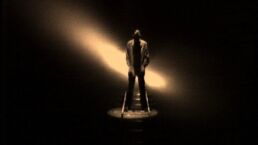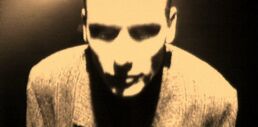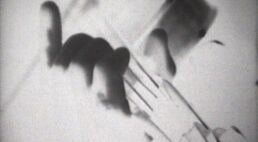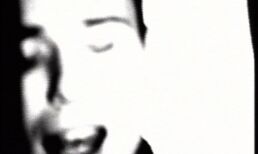ORKUS INTERVIEW
Martin Hall interviewed by Torsten Pape for Orkus Magazine in relation to the German release of ‘Random Hold’ (October 1997)
Your discography and bibliography are very impressive and in your fatherland Denmark you seem to be a real star. What do you think is the secret of your success and why do you think that you are totally unknown here in Germany?
– Well, I think the right way to state my “stardom” in Denmark is that I’m properly as much infamous as famous in my home country. If the amount of publicity I’ve gathered during the years – reviews, articles, interviews etc. – was equivalent to sales, I would definitely be a millionaire. This, however, is not the case. I’ve gathered a very dedicated following and obviously sold a fair amount of records, but Denmark is a very little country, both in terms of possibilities and mentality. I’ve always been very bold about my views on basically everything which has made me a fairly controversial character in the press and on the music scene in general … “loved by many, but hated by more” so to speak. The success of my career is on the other hand very clearly that I’ve always done exactly what I’ve wanted to. I had a few albums released in Germany in the mid-eighties, Relief and Cutting Through, which as far as I’ve been informed did fairly well, but then again, that was another decade.
I’ve read that you have experimented with the mixture of electronic and classical instruments for a very long time. How did you come to this kind of musical expression? Please explain what fascinates you about these apparent opposites, and how do you see your own musical development in comparison to other artists?
– I started playing classical guitar at the age of ten, not so much for the love of this kind of music, more as a matter of basic learning. I’ve always loved music, but not in an isolated way, more in relation to what the composer or singer was trying to pass on to his or her audience – music being a means to an end, a translation of feelings, a media. I think, it’s been a very natural process for me to explore the grey zones between different genres. I’ve always loved the symphonic element of the orchestra, the cinematic aspects they could offer an otherwise fairly fragile song, but then the electronic set-up has the intimacy and independency that’s the core of all my music making. Early on with Ballet Mécanique, my first group, the violins and cello added a more timeless touch to the music, but I think it all comes down to a personal taste and preference, mine being string-sections and ambience. “Performance” on Random Hold is a good example of this inclination; all the sounds on the track are samples of an organic or environmental nature – breathing, heartbeats, outdoor recordings of industrial machinery etc. – which put together with a very discrete string arrangement at the end of the song very successfully portrays my general state of mind. It has a certain beautiful solitude about it. Like a lot of the images in Tarkovsky’s Stalker. The Random Hold album was an attempt to create this kind of audio-image, where all the sounds were generated by the producer team, not just sitting down with a pre-programmed keyboard to record a song. We recorded it mobile, at an isolated art school in the summertime, using the empty halls, silos, rooms to create the ambience on the recordings. In this kind of work-situation samplers and digital recording facilities embrace the music, maximize the organic sound material – it becomes intellectual to consider the differences between the electronic and the acoustic influences. It all works together, if the material allows it to do so.
You have also written books and dealt with video art and making films. How would you describe your actions in these directions, and what kind of artistic expression do you like the most?
– I’ve always worked with whatever possibilities, I’ve had access to. Obviously pen and paper being an important one. As I stated before, I’ve always been more interested in what kind of essence, meaning, urge, intelligence moved through the music, as opposed to what kind of ego did. I didn’t really want to be a “pop star” or whatever you’d like to call it, I wanted to change the world. I didn’t set out to be a singer, I became so because there wasn’t anyone else around at the time. I started writing lyrics, poems, pieces for magazines at a very early age simply because I couldn’t not do so. It was a natural expression. I think that’s what art is all about, not being able to not do so. To give a certain state of mind a focus, a form, a theatre in which to portray itself. In this relation I used whatever came my way, two-track recorders, old amplifiers, photocopy machines at schools… everything developing very naturally across borders. Poems in books are lyrics for songs, songs with good lyrics offer new images to the mind of the listener, images in the mind create paintings, photos, illustrations, drawings etc. It’s all about development, reaching new perceptions, getting on with your life. In the words of the Dalai Lama, “the quality of art is, that it makes people who are otherwise always looking outward, turn inward”. That’s one way of putting it. But to return to your question, I’ve simply journeyed as many fields as possible to narrow it down to the basics, which in my case is words and music. I don’t think a person should be too selective too early. This seems applicable to all areas of life.
What kind of music, films or books do you prefer in your private life?
– I always tend to avoid to be too specific on this issue. When people ask me, what I’ve been most influenced by, it’s very difficult for me to answer, if it’s the Sex Pistols or Arvo Pärt. I mean, at the time of the release of “God Save the Queen”, that single changed my life, but then a lot of other records continued to do so in the years after that. Gavin Bryars, Scott Walker, Wim Mertens, Richard Jobson, Gabriel Fauré. This goes for literature as well. I was deeply engrossed in writers such as Baudelaire and Rimbaud, Nietzsche, but then in other periods it would English poetry, T. S. Eliot and Christopher Isherwood. Evelyn Waugh’s Decline And Fall is a wonderful book. I still enjoy the writings of Rainer Maria Rilke a lot. But then that leaves out the metaphysical catalogue. Cutting a long story short, I’d put Leonardo Da Vinci at the top of the list. Considering my ramble about art before, you should be able to see why.
Your lyrics seem very introspective, because there are many descriptions of your own feelings. What kind of person is Martin Hall, what characters are inside you – which of them are shown in your lyrics, and what are reasons for you to express your feelings?
– I don’t have a particular wish to express my feelings anymore, but it seems, it’s all I’m really able to do. I think, I’m writing a lot from one particular state of mind, from the standpoint of the observer. I find myself monitoring and describing what’s going on in me, the states I’m moving through, not necessarily because I find them attractive to write about, more simply because they’re what’s happening to me. Some people find my lyrics very depressing, view me as a very depressed person, which I’m not. Spending a lot of years being depressed might explain the flavour of the material, I don’t know. Other people find me very intellectual, which I can’t relate to either. I think the best way to describe myself is as a vacant mind, established with a lot of filters downwards to prevent any unnecessary pollution. If you have a tendency towards the suicidal, it’s very important to make up your mind about living, to make a choice, live or die. Everything else is a waste of time. I’ve made mine.
There are some words and metaphors that appear very often in your lyrics (the night, the moon, wounds, to bleed etc.). Please tell me something about them, their importance to you, their relation to your life.
– Well, isolated like that, it sounds very melodramatic. I think the fact that I’m using a lot of what you could call dark imagery, is a matter of taking the focus away from the action and turbulence of the surrounding world, directing it more towards oneself as a life, the more fragile aspects of it, the more vulnerable sides of living. Vulnerability is very often considered to be a weak state, which to me is a quite ridiculous concept. Vulnerability is sensitivity, the ability to reach beyond the Neanderthal state. The lyrics on the Random Hold are very “placeless” – they could be happening anywhere, because they’re a state of mind, a state of reflective consciousness if you want to put it like that. They’re written to seal off an inner territory, a kind of mental and emotional hinterland, where you can go, when you want to, a safe haven. I mean, I can’t imagine the record being played at a disco … It all sounds a bit over the top, but my point is that the music should make you pause a little while, act as a kind of stillness, become a room in which you can spend some time on your own. It’s more a state of mind than music. Anyway …
From 1986 to 1992 you had an intense interest in metaphysics. Please say something about that. How does this kind of science fascinate you?
– Where to begin …? In general terms “how” is an accepted question, “why” is not. “How” deals with the mechanical aspects of life, “why” with the unexplainable aspects of it. I’ve always had a very strong desire to try to understand things, to be able to deal with life. Without going into the depth of the matter, I think it was a necessity for me to leave behind the music business for a while, to deepen my understanding of things, of anything that could offer a way out of the trap I found myself in at that point in time. I mean, I had become a kind of figurehead for a lot of people at that time, almost like a spokesman for a generation, which was a role I in no way could identify myself with. So I went into an isolated period of two years, practicing Kundalini yoga, meditation, going to lectures, visiting esoteric societies, spiritual fraternities etc., basically anything that could offer me a broader understanding of the world I’d been born into. To me it wasn’t like a hobby or an interest anymore, it was a necessity, a change of direction. Drugs might offer you some degree of new perception, but only for a while – ultimately the idea is to make it a permanent state of mind, not just an occasional kick. Most people find the concept “the meaning of life” a joke, but then again, if you’ve been pushed far enough, it becomes more than an intellectual question. I don’t think you’re able to understand very much, if you haven’t had some degree of loss in your life, some degree of pain and suffering – it does mature people. Resistance is a great teacher. Need is the mother of all wisdom. If you don’t hunger for something, your understanding of it is going to very shallow. If you’re satisfied with the world and the answers it offers, fine, go no further; if you’re not, don’t expect anyone else to bring you what you need. There is no “secret knowledge”, it’s only secret to those too lazy to try to attain it. The metaphysical question, the science of it, everything from Eastern mysticism to the Tarot, it’s a mirror of the human mind, a way of understanding yourself and the world in a better way. It’s a shame that a lot of people consider it to be a religious thing. As a first principle it’s a development issue for the individual. That it stretches far beyond the individual is another thing.
In your song “Cradlemoon” you describe an escape from this world. What are the reasons for this wish of being far away?
– I think it’s a very natural response to most human company. After years of chaos, my aim is peace of mind … that’s my addiction, I suppose. The calm after the storm. I need a fair amount of stillness around me. Not always, but at least on a continuous basis. “Cradlemoon” is a kind of post-modern lullaby, a serenade, a nocturnal longing. Again, it’s this kind of reflective state, looking at the images that pass through your mind before sleep. It’s a song marking the threshold between one world and another, reality as we see it and sleep, the world of dreams. The image of a cradle moon, this thin curve on the night sky, it’s almost like you could climb it and go to sleep in it. I don’t know, maybe I’m just another hopeless romantic, the last renaissance artist of the century. These images a very dear to me. They carry a wonderful weightless sense to them. Like the poetry of Shelley and Blake. Always out of your hand, whenever you try to grab them.
Especially “She’s Eternal” touched my heart. Sometimes it seems that she is a person, but most of the time that it’s your inner world. What explanation is right? Why do you “never wanted her to see”, and why does the world die if she dies?
– Well, first of all, I’m very pleased about your focus towards the lyrics on the album. It’s been a recurring phenomena in Germany, that there’s a lot of interest directed towards the lyrics. “She’s Eternal” is a kind of a hymn to the female gender, to the essence of it, but in that respect as abstract as it’s specific. I do think a third element can occur between two people, a third state beyond the two, something bigger than both of the individuals so to speak. One of my considerations in the song is to not mess this up. The line you’re referring to is “I never wanted her to see the godless world inside of me”, which in a way summons up this longing after keeping something pure, although you yourself might be quite battered. I think people are going to find their own storyline in this song because of the imagery used in it. The term “with her the world dies” refers to the lack of focus towards anything else than the moment, the present state of mind, the peace you’re able to find in another person’s shadow. But again, it’s one of these songs that needs to be heard rather than analysed. I find it difficult to say much more about it. It’s like a picture. It’s easier to make someone look at it instead of describing it to them.
Are there plans for the future and especially gigs planned here in Germany?
– Public Propaganda is trying to arrange a tour in the new year. I’m playing very few concerts in general, but after the warm welcome the record seems to have received, I’m obviously looking forwards to visit at some point. However, I haven’t got any idea of the line-up. We shall see. Things happen in the strangest ways at the moment. I’ve just released a live recording in Denmark from the National Danish Radio where I recently performed with a string quartet. This might find its way to Germany as well, I don’t know. Concerning plans for the future, yes. Always. A lot of plans. But so much about that for now. I think I’ve said enough. Thank you very much for the attention.




